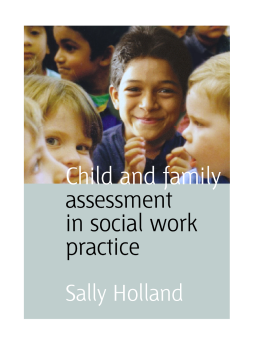
Additional Information
Book Details
Abstract
`A thoughtful, sensitive and clear articulation of core issues relating to the theory and practice of assessments in social work with children and their families. It will, no doubt, become a key text on the reading lists of students social workers and practitioners both in Britain and elsewhere' - Journal of Social Policy
`Sally Holland has pulled off a difficult job in writing this accessible and important book. She has successfully integrated findings from her own detailed qualitative, empirical work with pragmatic, useful and, above all, ethically robust guidelines for practitioners on the conduct of assessments with children and families' - Child Abuse Review
`Sally Holland's book, in a rigorous and well-theorized way, explores the layers, processes and context of child care assessments while remaining rooted in what will be useful to social workers in improving their practice' - Audrey Mullender, Professor of Social Work, University of Warwick
'This book is well referenced and set out, and supplies a useful basis for each busy CAFCASS professional, at any level of experience, to consider how best to meet challenges. A copy for every team library is recommended' - Family Court Journal
Child and Family Assessment is an essential guide for both social work students and practitioners involved in the assessment of children and their families. It has a particular focus on in-depth 'core' assessments and guides the reader through the complexities of conducting detailed assessments of need and risk. It is a guide for practice that is strongly rooted in research evidence.
Child and Family Assessment is divided into three parts. The first explores different approaches to assessment work. It outlines the policy and practice and places them in context with child and the family. In Part Two the focus is on the people involved in child and family assessments: the children, their parents and the relationship between the assessors and the assessed. The assessment processes is outlined in the final part focussing particularly on planning, analysis, reporting and critical evaluation.
The book has a student friendly structure and includes a set of exercises that encourage readers to reflect upon the contents of the book and to apply learning to practice. Written in a clear and accessible style, this engaging text will be invaluable for anyone embarking on or already involved in child and family assessment.
'The great strength of this book is that it moves assessment away from the notion that it is a linear activity, that is, to assemble facts and reach a conclusion in a tightly defined and time constrained manner. The book is well presented, well constructed and written in a style that immediately engages the reader. Although it is addressed to child welfare workers, the considered material about research and the theory of assessment makes the book attractive to a wider professional constituency' - Australian Social Work
`Sally Holland's book, in a rigorous and well-theorised way, explores the layers, processes and context of child care assessments while remaining rooted in what will be useful to social workers in improving their practice' - Audrey Mullender, Professor of Social Work, University of Warwick
Table of Contents
| Section Title | Page | Action | Price |
|---|---|---|---|
| Acknowledgments | |||
| 1. Introduction – what this book tells us about commercial value chains that include the poor | |||
| Malcolm Harper, Rajeev Roy and John Belt | |||
| Part one: Non-food Value Chains | |||
| 2. Khat from Ethiopia to Somaliland | |||
| Abdirazak Warsame | |||
| 3. Beer from bananas in Tanzania – a good drink and many good jobs | |||
| Jimmy Ebong and Henri van der Land | |||
| 4. Changing cotton seed production improves poor people’s livelihoods in South Rajasthan | |||
| Kulranjan Kujur and Vickram Kumar | |||
| 5. Stove liners in Kenya – less pollution, less charcoal and more income | |||
| Hugh Allen | |||
| 6. Granite in Odisha – from Indian quarries to European kitchens, if government allows | |||
| Malcolm Harper | |||
| 7. Remittances – from the global diaspora to the poor in Somalia | |||
| Abdi Abokor Yusuf | |||
| Part two: Commodity foods | |||
| 8. Nyirefami millet – a traditional Tanzania crop, marketed in a modern way | |||
| Jimmy Ebong and Henri van der Land | |||
| 9. Rice – smallholder farmers in Malawi can be profitably included | |||
| Rollins Chitika | |||
| 10. Angkor Rice – 50,000 Cambodian farmers growing for export | |||
| Rajeev Roy | |||
| 11. Moksha Yug – Indian dairy farmers don’t have to be in cooperatives | |||
| Chandrakanta Sahoo | |||
| 12. Suguna Poultry – decentralised village production is good business | |||
| Malcolm Harper, Rajeev Roy and Phanish Kumar | |||
| Part three: Non-commodity foods | |||
| 13. Green beans – from small farmers in Senegal to gourmets in Europe | |||
| Miet Maertens | |||
| 14. Odisha cashew nuts to global markets – value added all the way | |||
| Kulranjan Kujur | |||
| 15. Palm oil in Peru – small-scale farmers succeed where plantations failed | |||
| Rafael Meza | |||
| 16. Organic turmeric from eastern India – healthy spice and healthy earnings | |||
| Niraj Kumar | |||
| 17. Conclusion – what can we learn? | |||
| Malcolm Harper |
